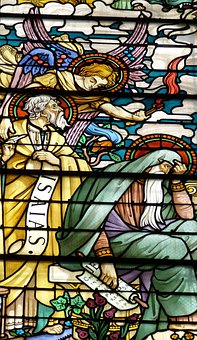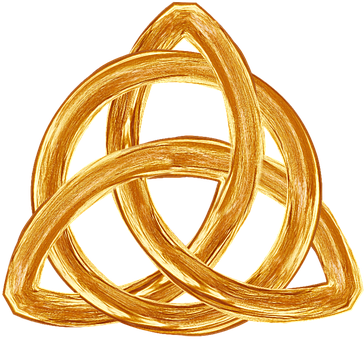For to us a Child is born, to us a Son is given; and the government shall be on His shoulder; and His name shall be called Wonderful, Counselor, The mighty God, The everlasting Father, The Prince of Peace. Isaiah 9:6
The Trinity?
Jesus increased in wisdom A simple look at these words tells us that Jesus is not God and therefore not part of the supposed Trinity. How could the omniscient (all-knowing) God increase in wisdom?
Jesus increased in stature and in favour with God and man. Luke 2:52. A troubling question does pop up: if Jesus is God how could He increase in favour with God? Jesus was not born a “superman.” He developed as He grew. Guzik.
Jesus increased in stature and in favour with God and man. Luke 2:52. A troubling question does pop up: if Jesus is God how could He increase in favour with God? Jesus was not born a “superman.” He developed as He grew. Guzik.
Theologians tell us that that statement is made about Christ's human nature and not His divine nature. This teaching is referred to as "the two natures of Christ".
There is absolutely nothing in Luke 2:52 that even hints at that possibility. Rather than believing that Christ had a split personality, with its associated traits, why don't we go with what the Bible says about Him - He never was and never will be "God of very God".
Theologians bend the scriptures to prove a point which the Bible nowhere makes!
There is absolutely nothing in Luke 2:52 that even hints at that possibility. Rather than believing that Christ had a split personality, with its associated traits, why don't we go with what the Bible says about Him - He never was and never will be "God of very God".
Theologians bend the scriptures to prove a point which the Bible nowhere makes!
A short note on Isaiah 9:6.
For to us a Child is born, to us a Son is given; and the government shall be on His shoulder; and His name shall be called Wonderful, Counselor, The mighty God, The everlasting Father, The Prince of Peace. Isa 9:6
These words were spoken by Isaiah about 700 years before Christ was born. As we studied in the blog called "Spaceship Theology", Isaiah was speaking of his son which was soon to be born. We also learned that many statements that were made pertained to the time in which they were spoken but they also had a prophetic content.
Matthew applied those words to the birth of Christ. However, a little bit of digging will show that he did not say that Christ would be The mighty God, The everlasting Father.
Isaiah 9:6 refers to Christ, and if Christ is equal to the Father, as Trinitarians tell us He is, then, our mighty God was born in Bethlehem. If our God was born in Bethlehem than He is on par with the Greek, Zeus; and the Hindu, Vishnu who is the second member of the Hindu Trinity. The God who maintains the order and harmony of the universe. Wikipedia.
These functions are also attributed to Christ by those who hold the doctrine of the Trinity. Do we really compare our God with Zeus or Vishnu?
Is this the likeness of the God we worship?
You would need to look long and hard before you would find any theologian in the Christian church who would admit that our mighty God was born in Bethlehem. Yet that is exactly what our preachers tell us when they insist that the special child, born in Bethlehem, "is the second person of the Godhead"; "God of very God".
So, was the church's mighty God born, or not?
The Mighty God
Matthew took the words of Isaiah 9:6
and applied them to Christ. So we, of course, have been taught, that Christ is a mighty God. In contrast, note that The leading Hebrew lexicon records that the word “god” used by Isaiah is applied elsewhere in Scripture to “men of might and rank,” as well as to angels. Who is Jesus. Anthony F. Buzzard, See also Psalm 82:6; Isaiah 41:23; John 10:34.
In the Hebrew language the word for Jehovah is "Adonai" but the word for god, where it means, a man of might and rank, is "adoni".
and applied them to Christ. So we, of course, have been taught, that Christ is a mighty God. In contrast, note that The leading Hebrew lexicon records that the word “god” used by Isaiah is applied elsewhere in Scripture to “men of might and rank,” as well as to angels. Who is Jesus. Anthony F. Buzzard, See also Psalm 82:6; Isaiah 41:23; John 10:34.
In the Hebrew language the word for Jehovah is "Adonai" but the word for god, where it means, a man of might and rank, is "adoni".
With that in mind, we can see that just because Matthew quoted that verse, from Isaiah, it does not mean that he thought of Jesus as a mighty God. In as far as the prophecy applied to Jesus, it meant only that He would be a man of might and rank. It should be remembered that Matthew wrote his gospel years after Christ was crucified, so Matthew already knew that Christ had been a man of might and rank.
The Septuagint, the Hebrew Old Testament translated into everyday Greek, was begun in the 3rd century BCE and was completed by 132 BCE. Wikipedia. The Brenton version (translated from the Septuagint in 1851) does not even include the phrase, a mighty God. This is what it says in Hebrew: For a child is born to us, and a son is given to us, whose government is upon his shoulder: and his name is called the Messenger of great counsel. Isa 9:6.
The Eternal Father
As for “eternal father,” this title was understood by the Jews as “father of the coming age.” Who is Jesus. Anthony F. Buzzard,
In Hebrew the words are Father-of-future. scripture4all.org./ To change those words into Everlasting Father completely, and erroneously, translates the Bible passage; again, probably, for the purpose of pushing the doctrine of the Trinity.
If we read this, as it is in the Hebrew Bible, the phrase takes all the strength out of the argument that Isaiah was writing about a God that would be born in Bethlehem; a God that would abide eternally. According to Matthew, Isaiah was speaking of Christ, but the most that Isaiah said, and the most Matthew understood Isaiah to mean, was that Christ would be a man of might and rank and that he would rule in the future.
In writing about the Trinity Anthony Buzzard quotes Soren Kierkegaard, "Christendom has done away with Christianity without being quite aware of it". (cited in Time magazine, Dec. 16, 1946, p. 64).
It is incredulous that many of those evangelical theologians who admit that the Bible does not teach the doctrine of the Trinity, believe it anyway.
For more on this topic see
https://www.blogger.com/blogger.g?blogID=1427739990392964732#editor/target=post;postID=3776231736584874428;onPublishedMenu=allposts;onClosedMenu=allposts;postNum=41;src=link
The reformers made great strides when they left the Roman Catholic church, but for them to reject all the unbiblical Roman Catholic tenets of faith, at once, may have been more than we should expect.
But, come on, that was five hundred years ago. Why do our theologians still cling to the traditions which were designed, without following the teachings of the Bible?
Perhaps we can, grudgingly, forgive the Roman Catholic teachers for their false teachings because they accept tradition as an acceptable guideline. However, there is no forgiving those who say that all our doctrines must be based on what the Bible teaches (sola scriptura - Latin for scriptures only) and then blatantly still follow that false, unbiblical teaching that was developed in the so-called Christian church, in the third and fourth centuries.


No comments:
Post a Comment